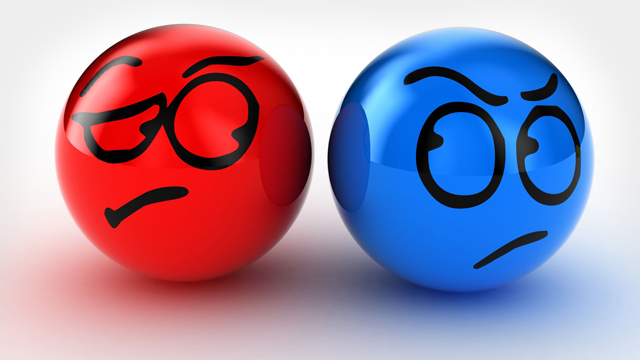
“...do not favor the poor or show deference to the rich; judge your neighbor fairly...You shall not hate your kinsman in your heart. Reprove your neighbor, but incur no guilt against your kinsfolk. Love your neighbor as yourself…”
-Leviticus 19:16-17
We judge others everyday. Whether good or bad, we silently assess the morals, appearance, opinions, and behaviors of others. In fact, a study by University of Texas professor, Rebecca Bigler, found that children as young as three-years-old begin to make divisions among themselves based on the differences they observe in appearance, favoring those similar to themselves.
To conduct the study, Bigler gave the preschool aged students each a t-shirt, colored red or blue. The shirts were distributed randomly and created two equal-sized groups in each classroom. During the course of the study, the teachers did not call attention to the colors or group them by color. When asked which color team was better, the children sided with their own, claiming that those in their group were better, smarter, or nicer.
According to Bigler, children attempt to categorize everything and base their categories on visible attributes. This may be a natural part of a child’s social development. But why don’t we shake this tendency to judge others as we grow older? Once we are capable of seeing past obvious physical traits and understanding that an individual is far more than simply the red shirt or blue shirt, why do we still judge? A few reasons include jealousy, ego, and our reactive behavior. Feeling envious of someone, feeling superior to another, or simply becoming annoyed by someone’s actions are emotional traps that lead to judgment. We begin to criticize them in order to feel better about ourselves.
If we are aware of the dangers of judgment we can attempt to turn the lens on our own behavior, where we can produce the greatest change. Read on and check-in with yourself—are you guilty of falling into the following judgment traps?
Jealousy
Noticing that someone has something we want leads us to judge the methods by which they got it. A friend gets into a top-notch university? Well, I’d have been accepted too if my parents had money to pay for private tutors. A coworker is promoted? Sure, he plays golf with the boss every weekend; they’re buddies! A colleague publishes a critically acclaimed book? Of course, she has plenty of time to write; she doesn’t have to support a family.
When someone receives recognition for their hard work it highlights our own perceived shortcomings. It reminds us that we haven’t worked hard enough, been as proactive, or as forthcoming in our pursuits of our dreams as we should be. It is human nature to feel a pang of jealousy. However, it is our choice to indulge in these negative thoughts and feelings or use the situation as fuel to jumpstart our ambitions. Next time you feel envy arise over the blessings of another, step out of your comfort zone and congratulate them. Then take a look at your own life. How can you plant seeds for future blessings in your own life? Be inspired, not envious.
Ego
Judgment is a crutch we lean on when we are feeling in adequate. Negative thoughts arise when we measure ourselves against someone else. The natural talents, characteristics, or blessings of another can make us feel lacking. We search for their flaws in order to make us feel better about our own, which ends up harming us in the end. Mentally cutting someone down to size may make us feel temporarily better about ourselves, but it feeds the ego and hinders our growth.
When you begin to feel your ego take root, shift your attention towards the positive. Start small by trying to see the beauty in the mundane; flip your tendency to see the bad by forcing yourself to think of positive traits or skills in others. When you focus on the good, you tend to only see the good. By making a habit of recognizing the good in all things, you’ll be more equipped to stop the ego before it starts taking down yourself and others.
Reactive Nature
Judgment can arise when we dislike the behavior of others. Most often, this behavior is parallel to our own. We are guilty of the same attitudes and behaviors we abhor in others, yet we don’t recognize it in ourselves; we have literally “disowned” the behavior.
If you start to feel judgmental of something someone has said or done, take an honest look at yourself and ask how have I behaved similarly in the past? What characteristics do we share? And how can I change this tendency in the future? You may be surprised to find that you share more in common with those you judge than you think.
Judgment divides us, when our goal should always be to connect to others and show compassion. Every individual must walk their own path through life, which naturally comes with unique successes and failures. As Michael Berg states in The Way, “Full awareness of our own intentions and motives is hard enough, so how can we pass judgment on another person’s life? ...If we accept that our understanding of the spiritual world is limited, it is foolish to imagine that we can see through the intricacies of the spiritual universe enough to penetrate the mysteries of other people’s destinies.” Our goal should always be to nonjudgmental acts of compassion—listening, assisting, and sharing.
